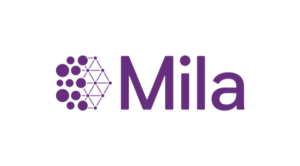Mila – Quebec AI Institute and PPF Academy are offering a joint learning program, AI Policy Compass: Navigating the Opportunities and Risks of artificial intelligence (AI). The program is designed to provide decision-makers and policymakers with a foundational understanding of AI technology, including an audit of current and emerging applications, its risks and transformative opportunities across fields. It introduces the latest legal and regulatory approaches to AI across the world, and imparts the essential understanding needed to shape the future of AI governance.
Who Should Attend
We welcome leaders and policy professionals from all levels of government (federal, provincial and municipal) as well as the private, academic and non-profit sector who are working on the development of AI governance and policy initiatives in their respective field and sector. Participants will have the opportunity to hear from world renowned AI experts, as well as the chance to connect with peers facing similar experiences and challenges. Special emphasis will be put on real-world use cases and tools to bridge the gap between theory and practice.
Program Themes
The AI Policy Compass program is designed to address the needs and questions of public policy leaders and is divided into four main themes:
- Unpacking AI and its Key Applications: Participants will gain a comprehensive understanding of AI, including definitions, key concepts, how it differs from other technologies, and the AI life cycle. They will also explore current and future applications of AI.
- AI Opportunities and Risks: Participants will learn from AI experts and case studies, exploring opportunities opened up by AI, as well as some of the risks and harms that can result from it.
- Emerging Responses and Solutions: Participants will be introduced to a policy framework that encompasses the major categories of responses to AI. They will learn to apply this framework to their own work and gain experience making AI related decisions they may need to make in their own sectors.
- Embracing AI Leadership: Participants will reflect on and discuss the key leadership questions they need to address to navigate the rapidly evolving AI policy landscape.
Learning Objectives
Upon completion of the program, participants will:
- Use an analytical framework to aid their AI policy decisions. Beyond the course, participants will continue to use this framework.
- Apply an understanding of AI technology, applications, implications, and policy responses to their work.
- Access the latest AI related resources. Beyond the course, participants will actively continue to inform themselves of the latest AI policy developments.
- Demonstrate confidence to act as AI policy leaders. Beyond the course, participants will be seen as AI policy champions in their organizations.
- Establish connections with peers facing similar AI governance challenges. Beyond the course, participants will stay active in this alumni network that will be fostered by Mila/PPF.
Teaching Method
The teaching method for this course include case studies, code, and lecturettes from AI experts. Learners will:
- Engage with relatable case studies demonstrating everyday interactions with technology, including some of the challenges and approaches to address those challenges;
- Enhance their understanding by exposure to actual code and practical demonstrations of how AI models work.
- Gain insights and engage with cutting edge insight from experts on different sub-facets of AI.
This program is suitable for learners of varied backgrounds and no prior computer programming experience is required. Through frameworks, facilitated discussions, exposure to real AI models and use cases, this program has an emphasis on leadership and decision-making in an AI-enabled world.
2024 Program Dates
In 2024, the AI Policy Compass program will be offered in the following locations:
Montreal – Mila office (French version)
- August 27th 9:00-16:30
- August 28th 9:00-14:00
(includes lunch both days)
Ottawa – PPF office (English version)
- November 28th 9:00-16:30 and
- November 29th 9:00-14:00
(includes lunch both days)
* Please contact the academy at academy@ppforum.ca if you would like to explore a customized version of this program for your organization.
Registration
Register now for Montreal
Register now for Ottawa
Program Cost
AI Policy Compass for Policy Professionals: $1,800 + tax, including all materials. A 15% discount is offered for PPF and Mila members.
Our Partner
About Mila
Located at the heart of Quebec’s artificial intelligence ecosystem, Mila – Québec AI Institute is a community of over 1000 researchers specialized in machine learning and dedicated to scientific excellence and innovation. Our mission is to build a global hub of scientific progress that inspires innovation and the growth of artificial intelligence for the benefit of all. The institute is recognized for its expertise and innovation in language modeling, machine translation, object recognition, and generative models.
Since its inception, Mila has focused its mission on core research areas such as health, environment and climate change, and the ethics of AI. The socially responsible development of AI is central to Mila’s mission. As a leader, the institute contributes to social dialogue and the development of applications that will benefit society through collaboration between researchers and stakeholders with diverse expertise who want to harness the potential of AI and advanced technologies to create a better world.
Learn more on https://mila.quebec/











